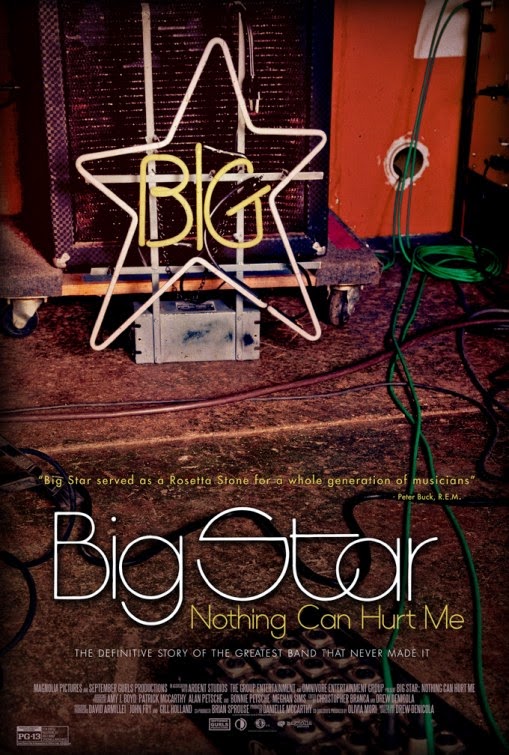Big Star: Nothing Can Hurt Me (2012) Directed by Drew DeNicola & Olivia Mori
Astrid:
Big Star is one of those things that Nick once owned and therefore I got to know something about it too. I liked the records, but I didn't pay too much attention to the funny enthusiasm that went with mentioning the band. Therefore, I never truly realised that Big Star is not at all known and not really a part of the canon of popular music – although it is becoming so right now as this documentary proves and manifests. Before I delve into the documentary, let me just tell you that I have met Jody Stevens in Austin Texas in 2007 at a hotel bar (with Nick). Man, I feel cool.
Big Star: Nothing Can Hurt Me is an effort to tell the story of most rock bands on some level. A band that's great but never makes it in front of a big audience. Of course, Big Star is different, because it is a sum of parts that have legendary status already before the band and definitely after it. There are rock'n'roll heroes and suicidal tendencies. There is exceptional talent and it really is unlucky that with all the brilliant cards in their hands the four-piece wind up with nothing so fast. (Of course they don't wind up with nothing, but Big Star as a band does not succeed). This documentary chooses to concentrate on uncovering the tragedy of Chris Bell, who died some years after Big Star finished and he made a failed attempt to becoming a solo artist. Meanwhile the doc overlooks the meandering musical story of Alex Chilton and pretty much just chooses to portray him as the ungrateful and difficult one.
 |
| Chris Bell |
Nick seems to have the information that Chris Bell was actually homosexual and that was part of his struggle to find his place in the band or in Memphis. I can believe that based on what we learn of his behaviour and short life, but I have no idea why gayness is not mentioned in the doc at all. Wouldn't it be an interesting and mind-tickling possibility that Big Star was actually a beautiful platform for a love story – one between the two song writers? I'm not just making this queer stuff up because I like it. It just kind of seems so obvious and the silence around the issue speaks loudly. In fact, isn't it a shame that homoerotic relationships in male bands remain an uncharted territory? Because with mixed bands (think Fleetwood Mac) that's all we ever hear about...
Nick:
My relationship with Big Star is a long one. First heard the band around 1987/88 (#1 Record). Then more love for the band grew upon hearing Radio City. One of my regular record shops in the late 1980's was in Egham (name escapes me now) and I remember them having the Dutch release (was it a bootleg?) of Third/Sister Lovers. After being passed over for many years, I eventually bought it around '89, it changed my view on a lot of things. Then came Teenage Fanclub and we were reminded of Big Star's brilliance again. Next thing you know Alex Chilton and Jody Stevens reformed the band with a couple of Posies. I'd been playing at this time in a heavily-indebted-to-Big-Star band called Juicy Fruit (it was). I saw the reformed band's first London show and even bought a t-shirt. Big Star was in my blood and from seeming obscurity, everyone was talking about the band. There was big currency to be had being a Big Star fan in the early 1990's. Funnily, nothing's really changed since.
 |
| Big Star |
 |
| William Eggleston's photo later used for the cover of Radio City |











Comments
Post a Comment